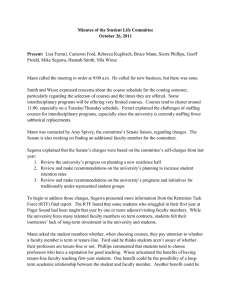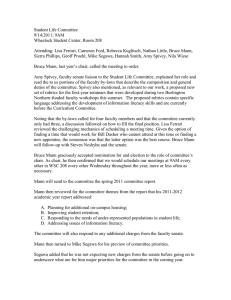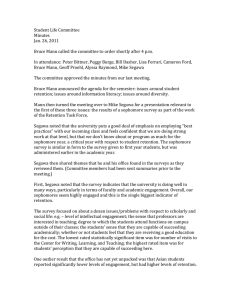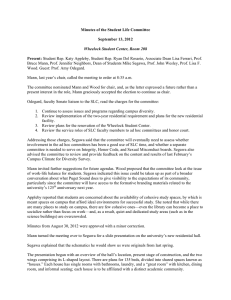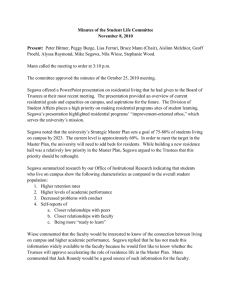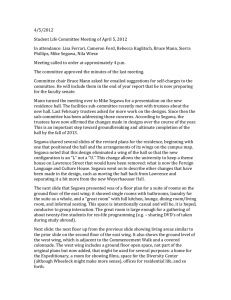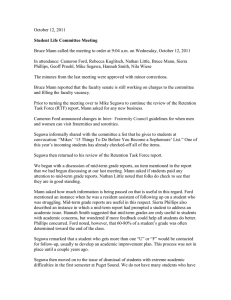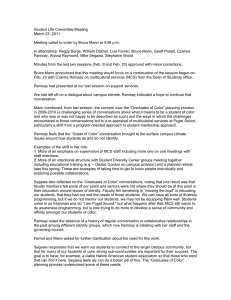Minutes of the Student Life Committee February 9, 2010
advertisement
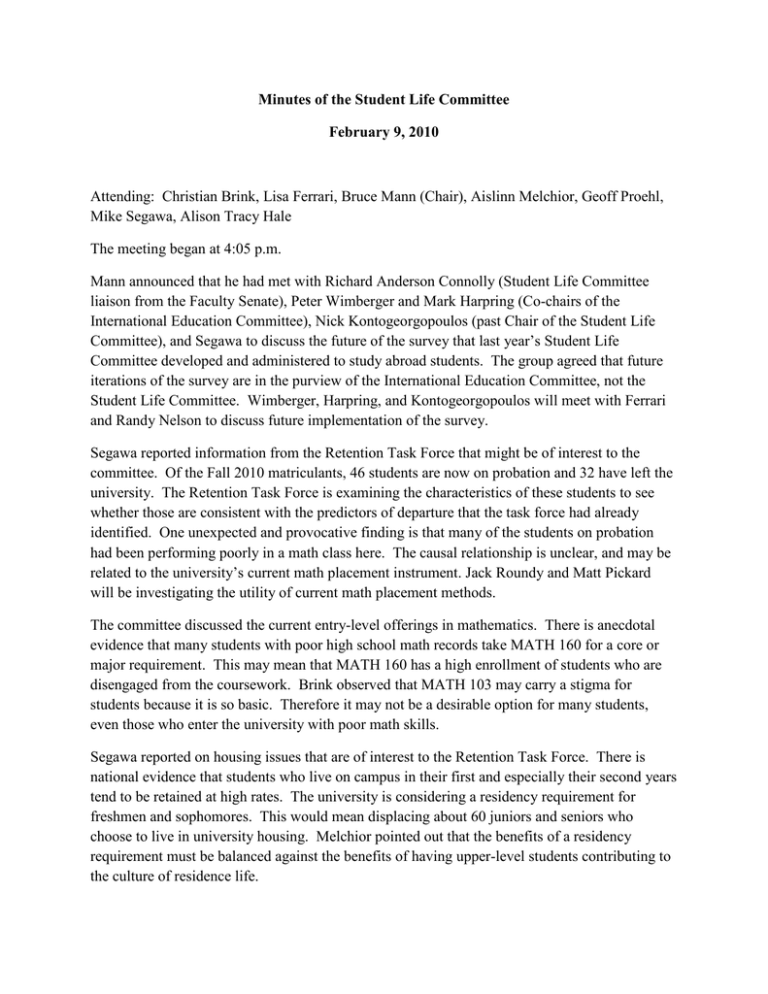
Minutes of the Student Life Committee February 9, 2010 Attending: Christian Brink, Lisa Ferrari, Bruce Mann (Chair), Aislinn Melchior, Geoff Proehl, Mike Segawa, Alison Tracy Hale The meeting began at 4:05 p.m. Mann announced that he had met with Richard Anderson Connolly (Student Life Committee liaison from the Faculty Senate), Peter Wimberger and Mark Harpring (Co-chairs of the International Education Committee), Nick Kontogeorgopoulos (past Chair of the Student Life Committee), and Segawa to discuss the future of the survey that last year’s Student Life Committee developed and administered to study abroad students. The group agreed that future iterations of the survey are in the purview of the International Education Committee, not the Student Life Committee. Wimberger, Harpring, and Kontogeorgopoulos will meet with Ferrari and Randy Nelson to discuss future implementation of the survey. Segawa reported information from the Retention Task Force that might be of interest to the committee. Of the Fall 2010 matriculants, 46 students are now on probation and 32 have left the university. The Retention Task Force is examining the characteristics of these students to see whether those are consistent with the predictors of departure that the task force had already identified. One unexpected and provocative finding is that many of the students on probation had been performing poorly in a math class here. The causal relationship is unclear, and may be related to the university’s current math placement instrument. Jack Roundy and Matt Pickard will be investigating the utility of current math placement methods. The committee discussed the current entry-level offerings in mathematics. There is anecdotal evidence that many students with poor high school math records take MATH 160 for a core or major requirement. This may mean that MATH 160 has a high enrollment of students who are disengaged from the coursework. Brink observed that MATH 103 may carry a stigma for students because it is so basic. Therefore it may not be a desirable option for many students, even those who enter the university with poor math skills. Segawa reported on housing issues that are of interest to the Retention Task Force. There is national evidence that students who live on campus in their first and especially their second years tend to be retained at high rates. The university is considering a residency requirement for freshmen and sophomores. This would mean displacing about 60 juniors and seniors who choose to live in university housing. Melchior pointed out that the benefits of a residency requirement must be balanced against the benefits of having upper-level students contributing to the culture of residence life. Segawa noted that, by current trends, juniors and seniors tend to choose to live in houses owned by the university. Freshmen live in double rooms in residence halls. Sophomores are distributed among Trimble suites, Union Avenue houses, and single rooms in residence halls. Because the university housing options available to sophomores are not always appealing, many students choose to live off campus beginning in their sophomore year. Segawa commented that while the President and Cabinet have emphasized the residential nature of the university, the campus master plan does not call for expanding student housing in the near future. Committee members were interested in the Humanities House. Segawa said that the Humanities House was well-liked by residents and Humanities faculty. Half of the residents are freshmen who took a first-year seminar in common during Fall 2009. The other half are upper-level students interested in the Humanities. The future of the Humanities House is unclear, since the building may house a fourth fraternity beginning in Fall 2011. Last year a Greek Life Review Team, including some Student Life Committee members, concluded that bringing a fourth fraternity to campus would be good for the university. Tracy Hale and Mann wondered whether an ongoing Humanities House would be more valuable to the university than a fourth fraternity. Mann asked whether ASUPS or other student organizations take up the issue of student housing. Brink was unaware of any such efforts. Mann suggested that the committee undertake discussion of student housing issues, including Greek expansion and a residency requirement for sophomores. Members agreed. The meeting was adjourned at 5:00 p.m. The next meeting will be Tuesday, February 23 at 4:00 p.m. in WSC 208. Respectfully submitted, Lisa Ferrari
